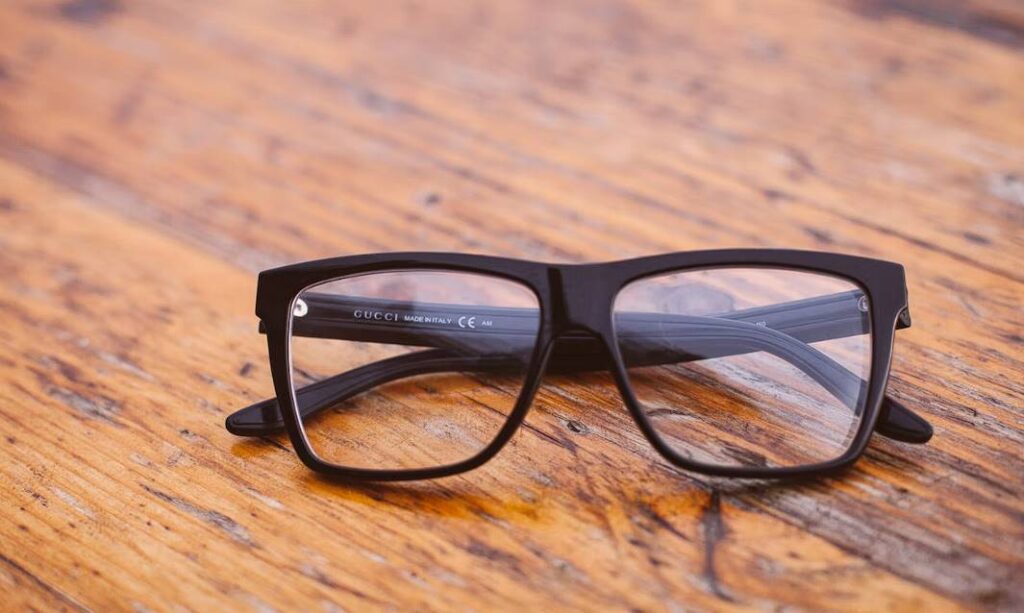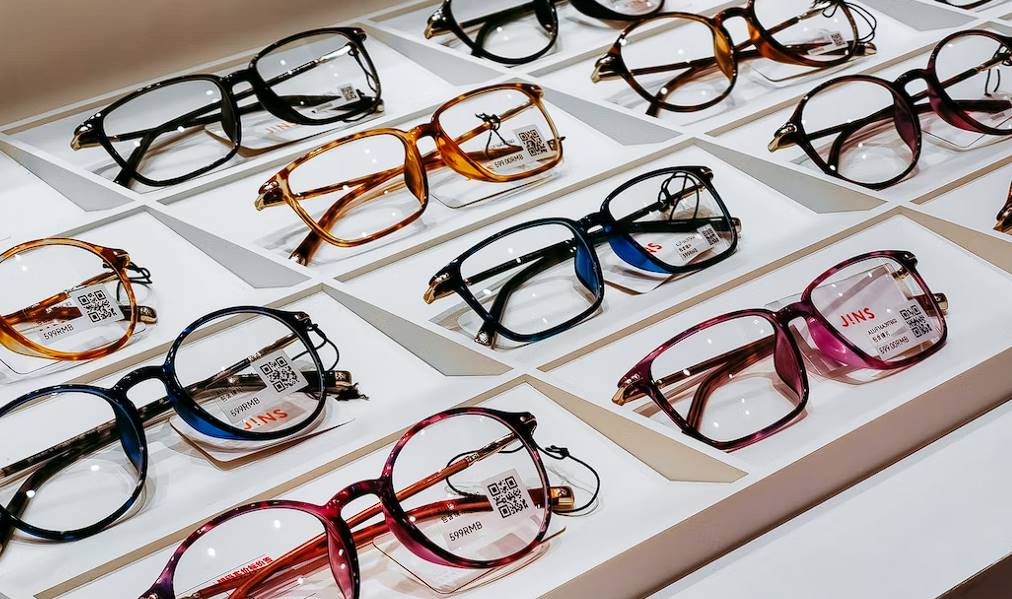Glasses with an anti-reflective coating on the lenses are known as anti-glare glasses. Reduces the glare that occurs when light strikes the lenses. Also called anti-reflective, no-glare, or glare-free coating. Since more light may now enter, there will be less clutter to the eye's field of view.
In certain contexts, such as nighttime driving and computer use, anti-glare glasses can improve visibility. Lenses with anti-reflective coating are more expensive to produce, but many wearers report improved vision and a more aesthetically pleasing result.
In this article, we'll look at the technology behind anti-reflective coating, the benefits and drawbacks of anti-glare glasses, the people we think would benefit the most from them, and how much they'll set you back.
What Exactly Are Anti-Glare Glasses?
Glasses with anti-reflective coatings fused to the lenses are known as anti-glare (AG) glasses, and they block light coming in from all directions. They improve the cosmetic appeal of spectacles while also making them more comfortable to wear and reducing eye strain.
By blocking off glare, the lens lets in 99 percent more light, improving contrast when night driving or working at a computer. Face aesthetics are another area where anti-glare lenses might aid. When the glare is gone, the lenses look crystal clear, which helps others focus on your eyes and make more eye contact with you. They may also be called "multi-layered anti-reflective" (MAR) or "anti-reflective" (AR) glasses depending on your optician.
To reduce reflections and glare, glasses can be treated with anti-reflective (AR) coatings. In order to increase the quantity of light that reaches the eyes, these lenses are coated with translucent and thin layers that absorb some of the light that would otherwise be reflected from the lens surface. This has various positive outcomes for people who need to wear glasses.
Refractive index changes on the lens surface are what make AR coatings effective. Light is normally partially reflected at the surface when it travels through one medium (like air) and into another (like glass). This glare can be very unpleasant and distracting, especially in bright environments. Anti-reflective (AR) coatings are applied to lenses to mitigate this reflection by softening the boundary between the air and the lens surface.
How Is Anti-Reflective Coating Applied?
Vacuum deposition technique is used in a highly technical process to apply anti-reflective coating to eyeglass lenses.
Before applying the AR coating, the lenses must be thoroughly cleaned and inspected for any surface flaws, both large and little. A poor AR coating can be caused by something as minor as a smudge, piece of lint, or a hairline scratch on the lens during the coating process.
Numerous washing and rinsing baths, sometimes incorporating ultrasonic cleaning to get rid of any last vestiges of surface pollutants, are standard on every production line. After this, the lenses are air-dried and heated in specialised ovens to further evaporate any remaining moisture or gases from the lens surface.
To ensure that all surfaces of the lenses are accessible for coating, they are placed in special metal racks with spring-loaded apertures. Next, the racks go into the coating room. A vacuum is created by sealing up the chamber's entrance and removing all of the air inside.
As the lens racks spin in the coating chamber, electrons from an internal power source are focused onto a little crucible containing a mixture of metal oxides.
The coating materials are vaporised within the coating chamber and stick to the lenses' surfaces when subjected to electron bombardment, resulting in a homogeneous, microscopically thin optical layer.
The augmented reality (AR) coating on some eyeglass lenses is applied in the manufacturing. The coating is added by an optical lab once the lenses have been customised to your eyeglass prescription, and this is the case for all lenses other than single-vision lenses.
Visual Benefits of Anti-Reflective Coatings
Increased Visual Clarity and Sharpness
The visual experience of those who wear glasses can be greatly enhanced by the addition of anti-reflective (AR) coatings. Increased clarity and sharpness, less glare and reflections, higher contrast and colour perception, and enhanced night vision and driving safety are just some of the advantages.
Improved sharpness and clarity of vision is one of the most noticeable effects of AR coatings. AR coatings let more light reach the eyes because they reduce reflections on the lens surface. As a result, the wearer's vision is enhanced, becoming clearer and more focused. AR coatings help provide a clearer and more precise visual experience, whether you're reading text or looking at anything far away.
Reduction of Glare and Reflections
The elimination of glare and reflections is yet another major benefit of AR coatings. When light reflects off of surfaces, it can cause glare, which is annoying and distracting. Reduced glare and improved visibility in high-contrast conditions are also benefits of AR coatings, which work by scattering less of the light that hits the lens than would otherwise be the case. This is useful in any setting with ample ambient light, but it's especially helpful when working or driving outside.
Improved Contrast and Color Perception
Both contrast and colour perception are boosted by AR coatings. These coatings allow more light to flow through the lenses and decrease reflections, which improves object contrast against backgrounds. This improves one's capacity to pick out subtle differences and see colours more clearly. Whether you're trying to read information on a page or take in the bright colours of a painting, AR coatings can improve the quality of your view.
Enhanced Night Vision and Driving Safety
Additionally, AR coatings help with night driving and improved visibility. Oncoming headlights or streetlights can create a distracting glare and decrease visibility when driving at night. Reduced glare from bright lights is only one of the many benefits that AR coatings provide to drivers. As a result, drivers will have better night vision and be less likely to have accidents caused by glare.
In conclusion, anti-reflective coatings for eyeglasses provide significant improvements in visual clarity. Better contrast and colour perception, superior night vision, and less glare and reflections are just a few of the benefits. AR coatings can make wearing eyeglasses more pleasant and rewarding by reducing the effects of external factors on vision and maximising light transmission through the lenses.
Functional Benefits of Anti-Reflective Coatings
Anti-reflective (AR) coatings improve visibility, but they also have a number of practical uses. All around, these advantages make eyeglasses more useful, comfy, and long-lasting. Better aesthetics and cosmetic appeal, less eye strain and fatigue, increased durability and scratch resistance, simplified cleaning and maintenance are only some of the practical advantages of AR coatings.
Improved Cosmetic Value and Aesthetics
- Lenses with AR coatings appear more see-through because reflections off their surface are diminished.
- They improve the wearer's natural appearance by allowing others to see their eyes more clearly.
- AR coatings reduce reflections, making the glasses look sleeker and more sophisticated.
Reduction of Eye Strain and Fatigue
- Reduced eye strain and weariness from staring at a computer or being in bright light are also benefits of AR coatings.
- Those who spend long hours in front of a computer or other digital device may appreciate the improvement in visual comfort that these glasses offer.
Improved Durability and Scratch Resistance
- Lenses for eyewear can benefit from AR coatings because they add an extra layer of protection against scratches.
- Lenses can be treated to increase their scratch resistance, which helps to preserve their clarity and durability.
- Newer coatings typically have better scratch resistance, but it's crucial to remember that AR coatings can still be scratched.
Easier Cleaning and Maintenance
- Lenses with AR coatings are less likely to accumulate fingerprints and smudges, making them much simpler to maintain.
- They reduce debris like dust and oil from sticking to the lenses.
- Reduce the frequency with which you need to clean and maintain your eyewear by using AR coatings.
Not only do AR coatings increase the visual experience, but they also make wearing and caring for eyeglasses much more convenient. The coatings improve the glasses' visual appeal, lessen the strain on the eyes, lengthen their lifespan, and make them easier to clean.
Considerations and Limitations
While there are many advantages to using anti-reflective (AR) coatings, there are also certain drawbacks that should be taken into account. To begin, the added manufacturing processes needed to apply AR coatings to eyewear might drive up their price. Some people may let this potential additional expense affect their final choice. In addition, AR coatings can reduce the lenses' longevity and protection. Scratches are less likely to penetrate AR coatings, but the coatings themselves may be scratched. Protect your AR-coated lenses by keeping them away from anything abrasive. AR coatings, while effective at reducing reflections, may require more regular cleaning due to their susceptibility to smudge. To avoid damaging AR coatings, mild cleaning procedures should be used. Despite these caveats and restrictions, many glasses-wearers think that AR coatings are worth it, as they improve their vision and make them happier with their frames.
How To Tell If You Need Anti-Reflective Glasses?
- AR coatings can greatly enhance visual clarity by minimising glare and reflections for glasses wearers, especially in bright surroundings or when using digital screens.
- AR coatings can improve night vision and driving safety for people who frequently drive in low light conditions, such as when glare from headlights or streetlights is a problem.
- With AR coatings, you may spend less time worrying about your eyes getting tired from staring at the screen and more time enjoying your work.
- With AR coatings, your lenses will look more translucent and polished, and people will be able to see your eyes more clearly if you wear glasses.
- You should think about whether or not the extra expense of AR coatings fits well with your priorities and current financial condition.
- If you want your glasses to be less of a maintenance hassle, AR coatings can lessen the amount of smearing that occurs when you wipe them clean.
- You may want to consult an optician or other eye care specialist about these issues so that you can receive advice tailored to your individual needs and preferences. If you're not sure if AR-coated glasses are the best option for you, they can evaluate your needs and help you make an educated decision.
Conclusion
In order to see clearly in bright environments, anti-reflective coatings are applied to eyewear. Although they cost more to make, many users report better eyesight and a more aesthetically pleasant end result from wearing them. In addition to enhancing the aesthetic value of eyewear, anti-reflective coatings decrease eye strain by blocking light from all directions. Lenses with AR coatings have had this reflection reduced by smoothing out the interface between the air and the lens surface. Anti-reflective coating is applied to eyeglass lenses using a vacuum deposition process.
As an added bonus, AR coatings make nighttime driving safer by decreasing glare from headlights and increasing visibility. When applied to eyeglasses, anti-reflective coatings (AR) greatly enhance clarity, contrast, colour perception, night vision, and reduce distracting glare and reflections. AR coatings can improve the experience of wearing eyeglasses by minimising the negative impact of environmental influences on vision and increasing the amount of light that enters the eyes. Improved visual value and aesthetics, lessened eye strain and fatigue, better durability and scratch resistance, simplified cleaning and maintenance are just some of the many practical benefits of AR coatings. However, it's important to weigh the benefits against the potential negatives, such as the additional manufacturing processes required to put AR coatings to eyeglasses and the possibility that scratches could pierce AR coatings.
Keep your lenses away from anything abrasive because AR coatings can degrade their durability and protection as well. People who drive frequently in low light may also benefit from AR coatings' ability to enhance night vision and driving safety, but it's crucial to consider whether or not the additional cost is a good fit for your objectives and financial situation.
Content Summary
- Glasses with an anti-reflective coating on the lenses are known as anti-glare glasses.
- Reduces the glare that occurs when light strikes the lenses.
- Also called anti-reflective, no-glare, or glare-free coating.
- In certain contexts, such as nighttime driving and computer use, anti-glare glasses can improve visibility.
- Lenses with anti-reflective coating are more expensive to produce, but many wearers report improved vision and a more aesthetically pleasing result.
- Glasses with anti-reflective coatings fused to the lenses are known as anti-glare (AG) glasses, and they block light coming in from all directions.
- Face aesthetics are another area where anti-glare lenses might aid.
- They may also be called "multi-layered anti-reflective" (MAR) or "anti-reflective" (AR) glasses depending on your optician.
- To reduce reflections and glare, glasses can be treated with anti-reflective (AR) coatings.
- This has various positive outcomes for people who need to wear glasses.
- Refractive index changes on the lens surface are what make AR coatings effective.
- Before applying the AR coating, the lenses must be thoroughly cleaned and inspected for any surface flaws, both large and little.
- A poor AR coating can be caused by something as minor as a smudge, piece of lint, or a hairline scratch on the lens during the coating process.
- After this, the lenses are air-dried and heated in specialised ovens to further evaporate any remaining moisture or gases from the lens surface.
- To ensure that all surfaces of the lenses are accessible for coating, they are placed in special metal racks with spring-loaded apertures.
- As the lens racks spin in the coating chamber, electrons from an internal power source are focused onto a little crucible containing a mixture of metal oxides.
- The coating materials are vaporised within the coating chamber and stick to the lenses' surfaces when subjected to electron bombardment, resulting in a homogeneous, microscopically thin optical layer.
- The augmented reality (AR) coating on some eyeglass lenses is applied in the manufacturing.
- The coating is added by an optical lab once the lenses have been customised to your eyeglass prescription, and this is the case for all lenses other than single-vision lenses.
- The visual experience of those who wear glasses can be greatly enhanced by the addition of anti-reflective (AR) coatings.
- Increased clarity and sharpness, less glare and reflections, higher contrast and colour perception, and enhanced night vision and driving safety are just some of the advantages.
- Improved sharpness and clarity of vision is one of the most noticeable effects of AR coatings.
- AR coatings let more light reach the eyes because they reduce reflections on the lens surface.
- As a result, the wearer's vision is enhanced, becoming clearer and more focused.
- AR coatings help provide a clearer and more precise visual experience, whether you're reading text or looking at anything far away.
- The elimination of glare and reflections is yet another major benefit of AR coatings.
- Reduced glare and improved visibility in high-contrast conditions are also benefits of AR coatings, which work by scattering less of the light that hits the lens than would otherwise be the case.
- Both contrast and colour perception are boosted by AR coatings.
- These coatings allow more light to flow through the lenses and decrease reflections, which improves object contrast against backgrounds.
- Whether you're trying to read information on a page or take in the bright colours of a painting, AR coatings can improve the quality of your view.
- Additionally, AR coatings help with night driving and improved visibility.
- Oncoming headlights or streetlights can create a distracting glare and decrease visibility when driving at night.
- Reduced glare from bright lights is only one of the many benefits that AR coatings provide to drivers.
- As a result, drivers will have better night vision and be less likely to have accidents caused by glare.
- Better contrast and colour perception, superior night vision, and less glare and reflections are just a few of the benefits.
- AR coatings can make wearing eyeglasses more pleasant and rewarding by reducing the effects of external factors on vision and maximising light transmission through the lenses.
- Anti-reflective (AR) coatings improve visibility, but they also have a number of practical uses.
- All around, these advantages make eyeglasses more useful, comfy, and long-lasting.
- Better aesthetics and cosmetic appeal, less eye strain and fatigue, increased durability and scratch resistance, simplified cleaning and maintenance are only some of the practical advantages of AR coatings.
- AR coatings reduce reflections, making the glasses look sleeker and more sophisticated.
- Lenses for eyewear can benefit from AR coatings because they add an extra layer of protection against scratches.
- Reduce the frequency with which you need to clean and maintain your eyewear by using AR coatings.
- Not only do AR coatings increase the visual experience, but they also make wearing and caring for eyeglasses much more convenient.
Frequently Asked Questions
Cleaning your glasses daily is not mandatory, but it is highly recommended to prevent eye strain. Regular cleaning helps maintain optimal vision by removing dirt, oil, and smudges that accumulate on the lenses. By keeping your glasses clean, you ensure that your eyes can see through them clearly without the need for additional effort, reducing the risk of eye strain.
Keeping your glasses clean offers several additional benefits beyond preventing eye strain. Clean glasses provide clearer vision, enhancing your overall visual experience. Moreover, clean glasses reduce the risk of smudging your lenses or obstructing your view due to dirt and fingerprints. By maintaining clean glasses, you also extend the lifespan of the lens coatings and prevent potential damage that could compromise their functionality.
Yes, dirty glasses can worsen existing eye conditions. Individuals with conditions like astigmatism or nearsightedness rely on glasses to correct their vision. When these glasses are dirty, the visual correction they provide becomes compromised. The dirt or smudges on the lenses can amplify the existing vision problems, making it harder to see clearly and potentially exacerbating the symptoms associated with the condition.
Yes, dirty glasses can contribute to headaches and eye pain. When you wear glasses with smudges or dirt, your eyes may have to strain to compensate for the reduced clarity. This constant effort can lead to eye muscle fatigue and tension, which can trigger headaches. Additionally, the strain on your eyes can cause discomfort and pain in and around the eye area.
When cleaning glasses, it's best to use a mild soap specifically formulated for eyewear or a lens cleaning solution. Avoid using harsh chemicals, ammonia-based cleaners, or abrasive materials as they can damage the lens coatings. To clean your glasses, gently rub the lenses with your fingertips or a soft, lint-free cloth in a circular motion. Rinse them thoroughly and pat dry with a clean microfiber cloth to avoid scratching the lenses.









